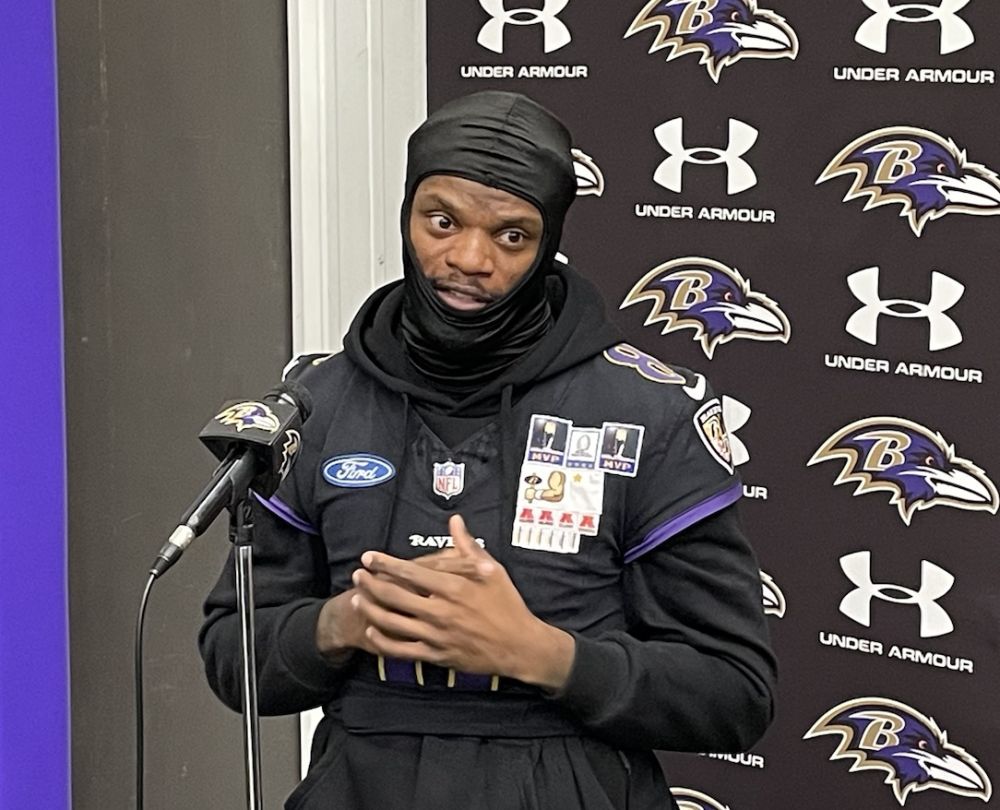Marlon Humphrey called it the “hard truth” in a subdued post-game locker room 10 months ago.
The Ravens haven’t really shaken it as the Tennessee Titans return to M&T Bank Stadium Sunday for a rematch of the stunning divisional round upset that ruined the best regular season in franchise history. According to the All-Pro cornerback, that 28-12 loss was a “choke” that destroyed three months of brilliance in three mistake-filled hours.
On the heels of a franchise-best 12-game winning streak to close the regular season, the Ravens looked and felt invincible going into the playoffs as the clear favorite to win the Super Bowl. Not only were the Ravens better than everyone they faced over the final three months of the season, but most of their opponents knew it too, often looking resigned to that reality after just a series or two of facing NFL MVP Lamar Jackson, a record-setting ground game, one of the more efficient play-action passing attacks in recent memory, and a defense that quietly became one of the league’s best by year’s end.
The Ravens didn’t expect to win as much as they knew they would, the kind of psychological edge that’s typically reserved for the talent gaps you see between teams at the collegiate and high school levels. They were feared for both their talent and their unique style of play that was so difficult for which to prepare.
And then it was over. Just like that.
That January night marked eight-time Pro Bowl right guard Marshal Yanda’s final NFL game, but the Ravens were young and seemingly ahead of schedule with a superstar quarterback who had just turned 23. Such a rationale made it easier to move on from the disappointing loss with so many assuming John Harbaugh’s team would pick up where it left off in the new season. Baltimore would even benefit from the league’s “easiest” schedule going into the new season.
But that magic has eluded the 2020 Ravens, who’ve already lost more games than they did a year ago. With Yanda no longer anchoring the offensive line and Baltimore seemingly attempting to lean more on its young wide receivers after the trade of tight end Hayden Hurst, the offense hasn’t maintained its 2019 identity, now sporting a strong-but-not-special running game and a passing game that’s fallen to the bottom third of the league in multiple categories. Jackson hasn’t sustained his MVP form from a year ago, but he also hasn’t gotten much help from his offensive teammates. And opposing defenses that so often looked clueless a year ago had an entire offseason to develop best practices to slow this offense more frequently.
Of course, that was all true before this month’s season-ending injuries to Pro Bowl left tackle Ronnie Stanley and blocking tight end Nick Boyle, arguably the two players not named Jackson that this offense could least afford to lose. An offensive line that was already missing Yanda is now an utter mess without its best player while the linchpin bridging the run and pass is also out of the picture, leading offensive coordinator Greg Roman to suggest on Thursday that the Ravens would “forge a new identity moving forward.” That’s not exactly the most assuring sentiment with two critical games in a five-day period rapidly approaching.
Even with these issues, Baltimore was still 6-2 at the midway point primarily because of its elite defense and special teams. Though their losses to Kansas City and Pittsburgh — the AFC’s top two teams — were disappointing, the Ravens had at least beaten all of the teams they were supposed to, leaving them in strong playoff position despite the Steelers’ unexpected 9-0 start.
But even that sentiment came crashing down last Sunday night as the run defense was gashed for 173 yards and the Ravens lost to a New England team whose only win since September had been a last-second three-point final over the winless New York Jets the previous week. Likely to be without top defensive linemen Calais Campbell and Brandon Williams once again this week, Wink Martindale’s undermanned defensive front will now be tasked with slowing Derrick Henry, the monstrous back who ran for more yards against the Ravens in that game last January than any player had in the franchise’s 25-year history. Unlike the Patriots, however, the Titans possess a potent passing game led by quarterback Ryan Tannehill, who’s thrown 20 touchdowns compared to just three interceptions this season.
With the Ravens already trailing the Steelers by three games in the AFC North and traveling to Heinz Field on a short Thanksgiving week, the time is right for an offensive resurgence if there’s to be one without Stanley and Boyle. Since their 5-0 start, the Titans have lost three of four, hardly making them a team to fear entering Week 11. The Tennessee defense that forced three turnovers and made four fourth-down stops in Baltimore last January has been below average against both the run and pass in 2020.
Then again, the Patriots also sported a poor defense before the Ravens failed to score 20 points in a regular-season game for the first time in over two years.
As critical as these next two games are to the Ravens’ dwindling hopes of remaining in the race for the division and the No. 1 seed, they’re probably more important from a psychological standpoint. A soft December slate that includes four of five games against teams with losing records provides more than enough opportunity to recover even with a loss to Tennessee or Pittsburgh — even both — but the defeat to the struggling Patriots was a shock to the system and the harshest reminder yet that this isn’t 2019 anymore.
Is anyone buying the Ravens as a January threat if they fall to 6-5 over the next week? More importantly, would they even be buying themselves?
Opponents no longer fear a team that looked all but unbeatable last season. We’ve seen the periodic comments about the offense being predictable after its “revolutionary” unveiling last season. The Ravens remain a football analytics darling when you see the still-favorable rankings from different outlets, but their reputation for being a front-runner that took off in the playoff loss to the Titans hasn’t been helped with the home defeats to the Chiefs and Steelers this season. Since winning 12 in a row to conclude the 2019 regular season, a 6-4 record doesn’t exactly scream that the Ravens are ready to take the next step as so many assumed entering 2020.
But there is something to be said for the Ravens experiencing more adversity and struggles than they did a year ago, especially when reflecting on the trials the Super Bowl champion teams in 2000 and 2012 endured. You just wonder how much is too much, however, particularly on the injury front after the offense remained remarkably healthy in 2019.
“Our record might not be the same, but I feel our mind is growing a lot,” said Jackson when asked to reflect on the ease of the 2019 regular season compared to this year. “We’ve learned a lot about ourselves. We just have to keep it going.”
We should learn plenty about the Ravens over these next two games, but the question is whether we’ll like what we see. On Sunday, the Ravens need the start of a renaissance more than they need revenge against the Titans.
And they’ll hope to avoid another hard truth.






















